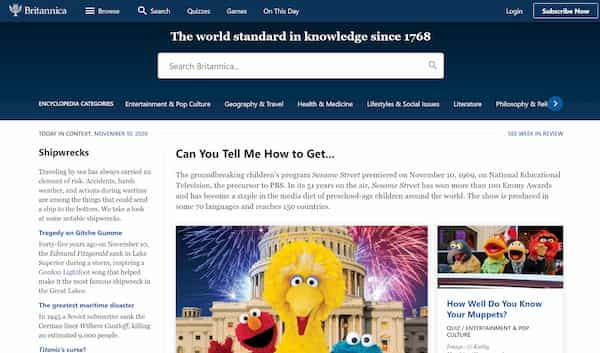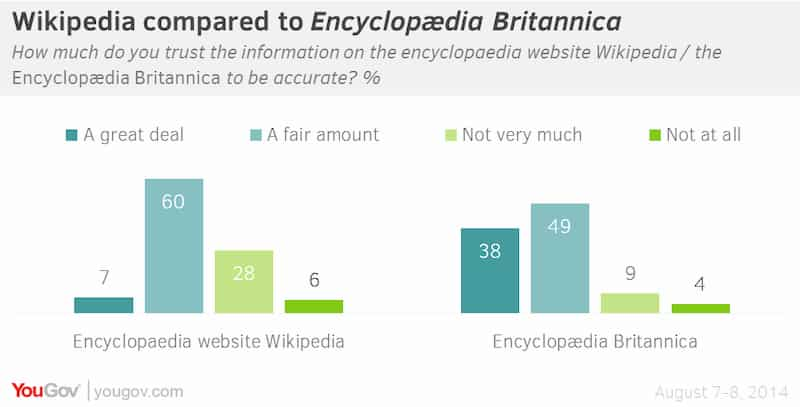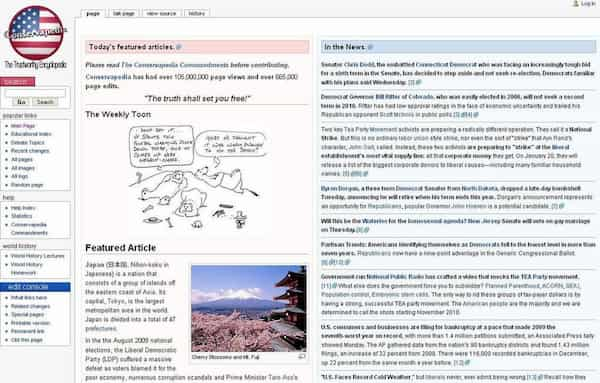Seven Free Wikipedia Alternatives
There are many free online encyclopedias to fit different needs, and you may have more choices than you expected. Here is a list of seven free Wikipedia alternatives.
Wikipedia is an excellent place to go for information, but many researchers don’t feel comfortable citing it as a resource due to its open contribution model – in other words, anyone can edit Wikipedia. They just don’t feel that Wikipedia is a reliable source of information, whereas a source like Britannica is, generally, more reliable.
Sections of this article
- Is Wikipedia the only Wiki?
- Why is Wikipedia so popular?
- Is Wikipedia reliable?
- Is there an alternative to Wikipedia?
Is Wikipedia the Only Wiki?
A wiki is simply a collaborative website or software that allows users to create and edit pages and content. Wiki comes from the Hawaiian word “wiki-wiki” which means “quick.”
The first acknowledged wiki was created in 1994 to allow for the exchange of ideas by a group of software designers. Since then, countless wikis of all sizes and subjects have been generated across the online world.
While Wikipedia is by far the best known, there are many smaller wikis for more specific topics. There’s a Star Trek-based Wiki and even one devoted to sandwiches.
There are other broader wiki sites dedicated to encyclopedic information but, hands down, the most popular one is Wikipedia.
If you’d like to learn more about our alternative wiki development service, click here.
Why Is Wikipedia So Popular?
Since its launch in 2001, Wikipedia has grown to become the largest online encyclopedia at 6.5 million articles and growing.
- Wikipedia dominates the Internet, having made fast friends with Google. There are a few key factors that cause Wikipedia articles to rise to the top of search results:
- On the technical side, Wikipedia is fast and lean.
- Wikipedia rarely loads slowly or experiences downtime.
Wikipedia is frequently updated since individuals are given the opportunity to revise content.
Is Wikipedia Reliable?
In his effort to give “every single person on the planet…free access to the sum of all human knowledge,” co-founder Jimmy Wales has very nearly succeeded.
However, the same factors that make Wikipedia a search engine superstar also bring the neutrality or outright truth of its content into question. Because of its open contribution model, many researchers don’t feel comfortable citing Wikipedia as a resource. In fact, many educational institutions won’t allow it because Wikipedia is notoriously unreliable. In fact, we must edit Wikipedia pages often to correct inaccurate information for our clients as part of the reputation management services we provide.
The prevalence of fake news and misinformation has caused us all to be critical of what we read online, including what we encounter on Wikipedia. We may trust Wikipedia to settle a bet about whether Abraham Lincoln was the 15th or 16th president (Wikipedia will confirm he was the 16th), but any serious research must be credited to verified professionals and academics as Wikipedia is sometimes considered to be unreliable.
Is There An Alternative To Wikipedia?
When you need ironclad information from an expert or scholar, you might want to place your trust in a more professional, vetted source. Or if you find the views of Wikipedia editors favor a certain agenda on some topics, it might be easier for you to find satisfactory answers in an encyclopedia that’s a bit different.
As we said above, Wikipedia is by far the most popular and largest source of information, but it is by no means the only one. For those who prefer more reliable knowledge, we have compiled seven Wikipedia alternatives that each offer different advantages.
Many online encyclopedias are written, fact-checked, and edited by experts and professionals. Some even offer choices between full-length articles and topic summaries. Any of the highly vetted, subscription-based publications should be considered extremely reliable. The differences between them will generally come down to size and breadth.
Encyclopedia Britannica Online
The largest and most comprehensive of these reliable resources is Encyclopedia Britannica Online, but is Britannica a reliable source?
First published in 1768, Britannica was once the most-referenced encyclopedia in the world. Wikipedia has grown to overshadow the encyclopedia in the Age of the Internet, but Britannica is still one of the most highly respected reference materials available. Yes, Britannica is a reliable source, and is certainly more reliable than Wikipedia.
The online version is a straight transfer from the printed version, which comes with the benefit of knowing that all the entries are made solely by professionals.
The disadvantage of Britannica Online is that the full version is not free (though it is incredibly cheaper than buying the entire collection of books). You can subscribe to Encyclopedia Britannica Online for about $75 per year, while you have to shell out almost $1,500 for the 32-volume book collection.
Scholarpedia
Wikipedia and Scholarpedia are both powered by WikiMedia, but Scholarpedia is comprised of more traditionally sourced material. Unlike Wikipedia, only invited experts can contribute to Scholarpedia.
Before they can be published, all new articles must be sponsored to confirm the identity and authority of the author. Articles are peer-reviews and require public approval from at least two experts.
The author’s name is attached to each article, and any edits must be approved by the author prior to publishing. This ensures that the articles are accurate and are not prone to vandalism that frequently occurs on Wikipedia.
Encyclopedia.com
Encylopedia.com enables you to search more than 200 encyclopedias and reference books. The site has 200,000 citable reference entries and more than 50,000 topic summaries with related images and videos, as well as newspaper and magazine articles from around the globe.
It pulls its entries from various sources, including Oxford University Press and Columbia Encyclopedia.
Infoplease
Infoplease is a publication of Pearson Education, the world’s largest distributor of educational literature. Its roots go back decades to a radio quiz show originally airing in the 1930s.
Content is collected from trusted sources like Random House Dictionary as well as the U.S. Census Bureau, the Library of Congress, and United Nations agencies like UNESCO and the World Health Organization. Infoplease also offers multimedia features for research assistance.
Instead of full-length articles like Wikipedia, Infoplease offers brief and informational topic summaries. While significantly shorter, the information is accurate and tamper-proof, and users are not able to contribute to the content.
Conservapedia
Wikipedia is believed by some to be too liberal. At Reputation X we can attest to bias by Wikipedia authors, especially in political or environmental contexts. This idea of bias in Wikipedia sparked the creation of Conservapedia, a conservative, Christian Wiki encyclopedia complete with seven Commandments that users must follow. To date they have over 850 million views.
Moderated by an editorial staff, Conservapedia does not allow foul language, sexual topics, or offensive material on the site. Those who believe Wikipedia shows too much of a liberal bias in their content might enjoy Conservapedia as an alternative.
Deletionpedia
Deletionpedia rescues deleted articles from Wikipedia. As of this writing, the site has rescued more than 90,000 deleted Wikipedia articles.
It uses a robot to look for Wikipedia pages that may be in danger of deletion by someone, and copies the article to Deletionpedia, ensuring a copy continues to exist for researchers.
World Book Encyclopedia
While not a free or web-based encyclopedia, there is one more option you might consider.
This 100-year-old encyclopedia, which at one time was a staple in many American households, has moved into the digital age at full speed. World Book Encyclopedia offers digital access to a number of databases based on their encyclopedias that encompass its massive collection of knowledge.
Even beyond basic research, World Book also offers educational programs and history-specific extras. It will require an annual subscription of $99 or more, based on the access you desire.
So Which One Should You Use?
With almost 6.5 million articles, Wikipedia is the largest free encyclopedia on the Internet. But that’s not all; it is also bigger than many traditionally published publications like the printed volumes of Britannica. Wikipedia has over 90 times the number of words as Encyclopedia Britannica Online.
While you may have to do a bit of fact-checking or source investigation when using Wikipedia as a resource, you have to admit it is very rare not to find the information you’re looking for, especially when Google plasters Wikipedia in most SERPs.
If you need very reliable information with no sourcing doubts, it is best to go with something like Encyclopedia Britannica Online or Scholarpedia. If you research regularly, it’s probably worth it to pay the annual subscription for an encyclopedia.
If you need quick and free information, you would be hard-pressed to find a better site than Wikipedia. If you are looking for a more specific deep dive into a certain approach, topic or even Klingon, we would suggest using one of the alternatives or smaller topic-focused wikis.
About the author
Kent Campbell is the chief strategist for Reputation X, a San Francisco Bay Area-based online reputation management services firm. He has over 15 years of experience with SEO, Wikipedia editing, review management, and online reputation strategy. Kent has helped celebrities, leaders, executives, and marketing professionals improve the way they are seen online. Kent writes about reputation, SEO, Wikipedia, and PR-related topics.
Tags: Wikipedia, Wikipedia Writing.



